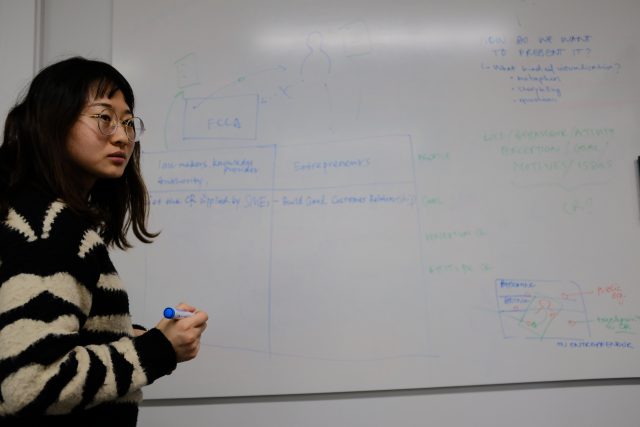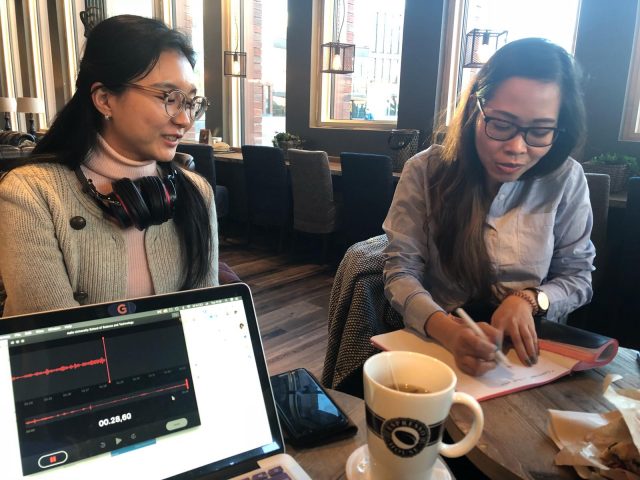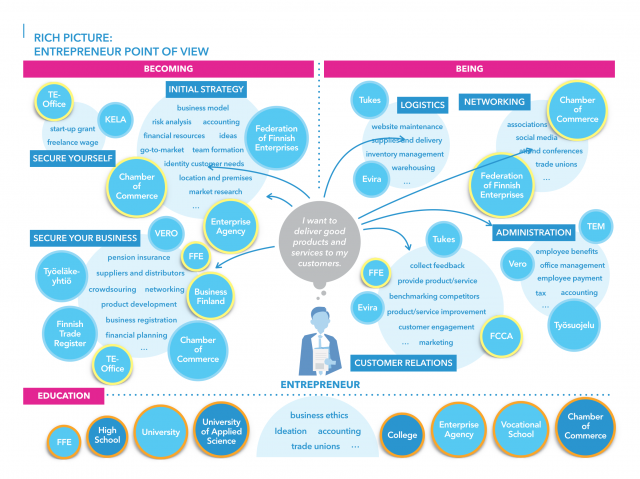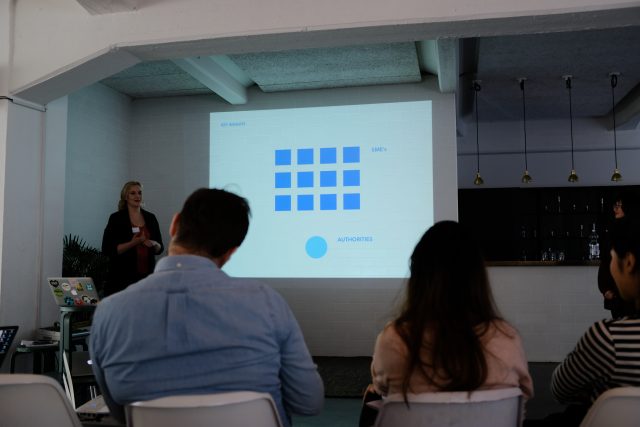This blog post reports on work-in-progress within the DfG course! The post is written by one of the two groups addressing the Finnish Competition and Consumer Authority’s brief on ‘Boosting Consumer Rights’. The group includes Jiyoung Son from the MA Collaborative and Industrial Design program, Linh Duong from Corporate Communication program, David Martens from Master of European Design program, Tiina Alanko from Social and Public Policy program of the University of Helsinki and Xuyang Zhang from the MA Collaborative and Industrial Design program.
As one of two teams addressing the project brief on consumer rights, we presented our progress to key stakeholders from the Finnish Competition and Consumer Authority (FCCA) during the mid-review on the 2nd of April. Our team researched into how and where consumer rights are present in education, the perception of small and medium enterprises (SMEs) is towards consumer (and the FCCA) and finally, what it means to become an entrepreneur!

“There is a decreased interest from SMEs (Small and Medium Enterprises) towards Consumer Rights.” Okay. Well, why would that be? Maybe because the SMEs do not have the resources? Or maybe because the system and language is too complicated? Do those SMEs even know the benefits or consequences of complying to consumer rights? In order to get answers to those questions, investigating the perspective of the SME’s felt necessary. Through in-depth interviews with 5 different entrepreneurs, we got to know more about the perception and attitude of SMEs towards consumer rights.
“Consumer Rights regulation is not a blueprint for good customer service.” Many entrepreneurs see consumer rights as a matter of compliance to the law, whereas the FCCA believes that complying to consumer rights might enhance a competitive advantage. Do consumer rights need a rebrand, to become part of a different narrative?

“Every entrepreneur has once started.” Taking this idea, our team decided to focus on the journey of becoming an entrepreneur. Understanding that every journey is individual, there are similar elements that every entrepreneur has to take into account when starting a business, and there are similar organisations that every entrepreneur will come across. If the FCCA would like to see consumer rights integrated into every business, we believe the most potential lies at the start of the journey, when entrepreneurs are setting up their company. This led us to create a rich picture of the journey of becoming (and being) an entrepreneur, including the many elements that the entrepreneur needs to tackle, and then the public organisations they come in contact with at every step. Also, we marked the organisations in which any information about consumer rights is currently shared (orange), and where we believe there is opportunity to communicate about consumer rights (yellow).
A mapping of the different steps every entrepreneur goes through, including the public institutions that are on their path. We divided the chart into three parts, becoming, being and education. The education part is at the bottom as we believe it informs both the process of becoming and being an entrepreneur. The mapping was created in a collective effort.
After presenting our research to the FCCA and experiencing their commitment, our team is currently figuring out how to collaborate with our clients, taking the opportunity to do a second workshop in order to work together towards a final proposal, increasing feasibility and impact. Our next steps will be to perform a deeper analysis on the data we have collected, to find physical touchpoints where CR could be integrated into the journey of becoming an entrepreneur, and to (re)establish a connection to our clients and the SMEs for further investigation, and possible collaboration.

The DfG course runs for 14 weeks each spring – the 2019 course has now started and runs 26 Feb to 21 May. It’s an advanced studio course in which students work in multidisciplinary teams to address project briefs commissioned by governmental ministries in Finland. The course proceeds through the spring as a series of teaching modules in which various research and design methods are applied to addressing the project briefs. Blog posts are written by student groups, in which they share news, experiences and insights from within the course activities and their project development. More information here about the DfG 2019 project briefs. Hold the date for the public finale 09:00-12:00 on Tuesday 21 May!
